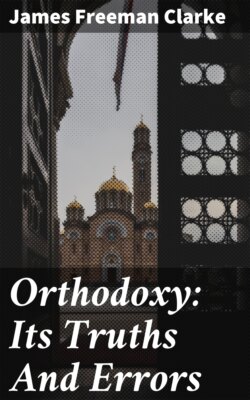Читать книгу Orthodoxy: Its Truths And Errors - James Freeman Clarke - Страница 23
На сайте Литреса книга снята с продажи.
§ 6. Supernatural Events not necessarily Violations of Law.
ОглавлениеTable of Contents
Now, says the supernaturalist, if we have all this evidence to show that God not only acts through nature, by carrying on existing forces and laws, but also has repeatedly come into nature with new creations, not there before—and if even man himself has a certain limited but strictly supernatural power, so as to be able to stand outside of the nexus of law, and act upon it—why deny, as incredible, that God should have made a new moral creation in Christianity? should have created a new class, order, genus, and species of spiritual beings, not represented before by any existing congeners? And why question that what we call miracles—that is, physical interferences with natural laws—should have attended this sudden influx of spiritual life? We do not claim, says the judicious supernaturalist (like Dr. Bushnell, for example), that miracles are suspensions or violations of natural laws; but that they are the natural modification of the agency of such laws by a new and powerful influence. Of this, too, there is ample analogy in nature. The mineral kingdom, for example, is passively subject to mechanical and chemical [pg 049] laws, which are resisted and modified by plants and animals. A stone obeys passively the law of gravitation; a plant resists it, rises into the air in opposition to it. Such a proceeding on the part of a plant must seem to a stone a pure miracle. If a piece of granite should write a book of theology, it would probably say that the plant, in growing up, had violated or suspended a law of nature. But it has not. The force of gravitation has worked on according to its own law; it has been dragging the plant downward all the time, only the vital power in the plant has overcome its force, and modified the result. And, again, a tree, seeing a dog run to and fro, might call that a miracle. The tree, unable to move from its place, could not conceive of the possibility of voluntary motion. But no law of nature is violated; only a higher power comes in—the power of animal life.
To a dog, again, the proceedings of a man are strictly miraculous. To plant corn, reap it, thresh it, grind it, and bake bread out of it, is exactly as much a miracle to the dog, as the multiplication of loaves, or turning water into wine, by Christ, is a miracle to us. But no law of nature was violated in either case. Reason in the one case, some profounder spiritual power in the other, may have modified the usual operation of law, and produced these results.
The Orthodox supernaturalist therefore contends that the supernatural is a constant element of life. Higher natures are all supernatural to lower natures, but natural in themselves, because obedient to the laws of their own nature. Nature, without this supernatural element, is only a machine, of which God, standing outside, turns the handle. This is a low conception both of nature and of God. As Goethe says, in one of his immortal lyrics—
“Not so, outside, doth the Creator linger,
Nor let the all of things run round his finger,
But moves its centre, not its outer rim;
Comes down to nature, draws it up to him;
Moving within, inspiring from above,
With currents ever new of light and love.”
[pg 050]
